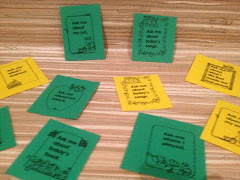Babble Breaks
Plan several three minute "babble breaks" where children can talk to their friends today. You could give them a topic to discuss that relates to a unit of study, let them tell jokes, or just chit chat.
Hint! Set a timer so children can learn to regulate when to begin and when to end.
*You might want to use the "buddy sticks" I described on October 4th for children to find a "babble buddy."

Traffic Light
Traffic light colors are a visual way to help children regulate the volume in the classroom. Hold up a green circle when they are free to talk. Yellow means they are a little loud and to turn it down. Red means "stop" talking and focus on the teacher.
Do you know what this is, what this is, what this is?
Do you know what this is? Please tell me more!
Ask me about our story.
Ask me what song we sang.
Ask me who I played with.
Ask me what I learned.
Ask me what we had to eat.
Puppets
Audio Recordings

Traffic Light
Traffic light colors are a visual way to help children regulate the volume in the classroom. Hold up a green circle when they are free to talk. Yellow means they are a little loud and to turn it down. Red means "stop" talking and focus on the teacher.
Place several interesting objects in a gift bag. One at a time, pull an object out and sing to the tune of “Do You Know the Muffin Man?”
Do you know what this is, what this is, what this is?
Do you know what this is? Please tell me more!
Encourage the children to identify the item and tell you as many descriptive words as they can about it.
Conversation Starters
Conversation Starters
Run off conversation starters similar to the ones below and place them in a paper sack. Children choose one before they go home at the end of the day and use it to tell their parents about their day.
Ask me about our story.
Ask me what song we sang.
Ask me who I played with.
Ask me what I learned.
Ask me what we had to eat.
Select small objects that relate to a story or unit of study. For example, you could use a button for Corduroy, a fake jewel for Fancy Nancy, a shell for an ocean unit, etc. Children take home the object and explain how the item relates to the book they heard or what they learned at school.
American Idol
American Idol
Let children take turns playing “American Idol” as they lead classmates in familiar songs.
Role Play
Role Play
Have children act out life situations. For example, what would you do if someone bullied you? What would you do if a stranger tried to get you to ride in their car? What would you do if you saw a fire? What would you do if you found $20 on the bus?
Puppets
Provide children with puppets and stuffed animals to act out stories and problems.
Audio Recordings
Let children practice reading simple books, saying rhymes, or singing songs with audio devices.




